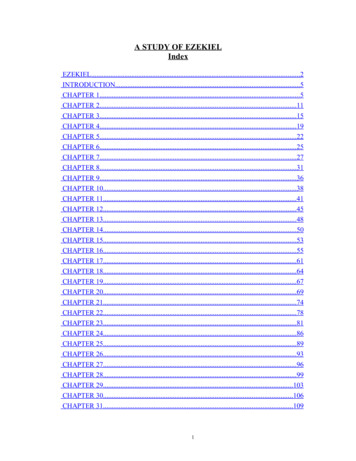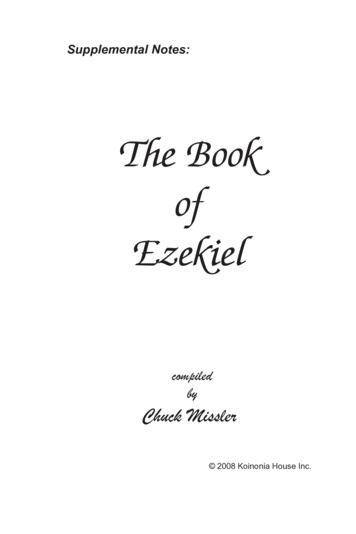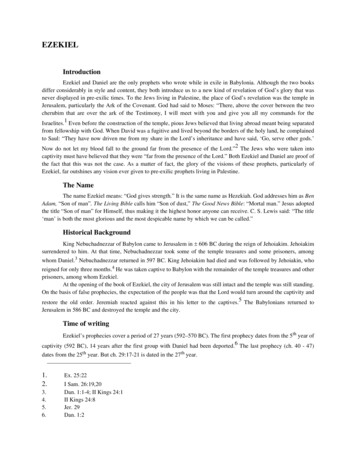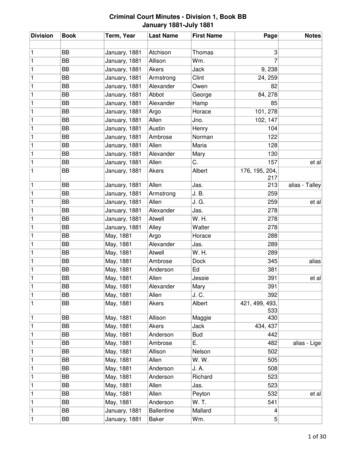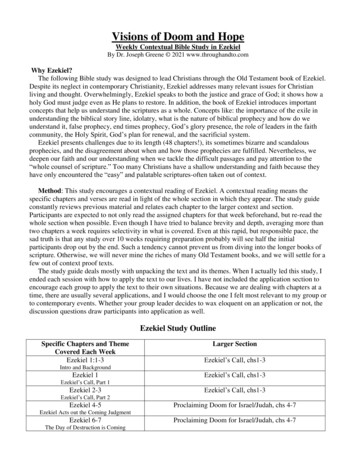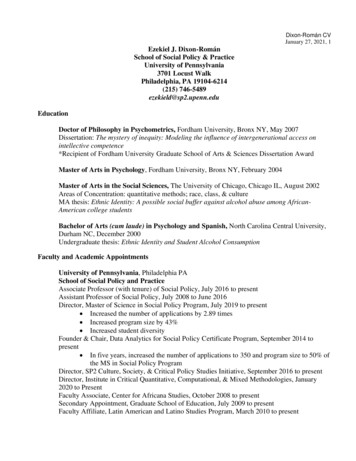
Transcription
Dixon-Román CVJanuary 27, 2021, 1Ezekiel J. Dixon-RománSchool of Social Policy & PracticeUniversity of Pennsylvania3701 Locust WalkPhiladelphia, PA 19104-6214(215) 746-5489ezekield@sp2.upenn.eduEducationDoctor of Philosophy in Psychometrics, Fordham University, Bronx NY, May 2007Dissertation: The mystery of inequity: Modeling the influence of intergenerational access onintellective competence*Recipient of Fordham University Graduate School of Arts & Sciences Dissertation AwardMaster of Arts in Psychology, Fordham University, Bronx NY, February 2004Master of Arts in the Social Sciences, The University of Chicago, Chicago IL, August 2002Areas of Concentration: quantitative methods; race, class, & cultureMA thesis: Ethnic Identity: A possible social buffer against alcohol abuse among AfricanAmerican college studentsBachelor of Arts (cum laude) in Psychology and Spanish, North Carolina Central University,Durham NC, December 2000Undergraduate thesis: Ethnic Identity and Student Alcohol ConsumptionFaculty and Academic AppointmentsUniversity of Pennsylvania, Philadelphia PASchool of Social Policy and PracticeAssociate Professor (with tenure) of Social Policy, July 2016 to presentAssistant Professor of Social Policy, July 2008 to June 2016Director, Master of Science in Social Policy Program, July 2019 to present Increased the number of applications by 2.89 times Increased program size by 43% Increased student diversityFounder & Chair, Data Analytics for Social Policy Certificate Program, September 2014 topresent In five years, increased the number of applications to 350 and program size to 50% ofthe MS in Social Policy ProgramDirector, SP2 Culture, Society, & Critical Policy Studies Initiative, September 2016 to presentDirector, Institute in Critical Quantitative, Computational, & Mixed Methodologies, January2020 to PresentFaculty Associate, Center for Africana Studies, October 2008 to presentSecondary Appointment, Graduate School of Education, July 2009 to presentFaculty Affiliate, Latin American and Latino Studies Program, March 2010 to present
Dixon-Román CVJanuary 27, 2021, 2Secondary Appointment, Department of Africana Studies, July 2012 to presentSecondary Appointment, Annenberg School for Communication, July 2020 to presentFaculty Affiliate, Gender, Sexuality, & Women’s Studies Program, January 2020 to presentFaculty Affiliate, Warren Center for Network & Data Sciences, May 2015 to presentDirector, SP2 Latino Social Service & Policy Initiative, September 2010 to June 2012University of British Columbia, Vancouver CanadaInstitute for Gender, Race, Sexuality and Social JusticeHonorary Faculty Member, July 2020 to PresentThe Taos InstituteInstitute Associate, March 2013 to PresentAarhus University, Copenhagen DenmarkFaculty of Arts, Danish School of EducationVisiting Professor, November 22nd – 26th 2021Columbia University, New York NYDepartment of SociologyVisiting Scholar, July 2018 to June 2019Pontificia Universidad Católica de Chile, Santiago ChileCentro de Justicia EducacionVisiting Professor, January 2019The Gordon Commission on the Future of Assessment in EducationCommission Member, July 2011 to February 2013Technical Advisor & Research Associate, January 2011 to June 2011University of California, Berkeley, Berkeley CAGraduate School of EducationVisiting Scholar, August 2011 to December 2011Northwestern University, Evanston ILCenter for Improving Methods for Quantitative Policy Research, Institute for PolicyResearchInstitute of Education Sciences Post-Doctoral Fellow, with Larry Hedges, March 2007 to June2008Post-Doctoral Fellow, with Larry Hedges, September 2006 to February 2007Lecturer, School of Education and Social Policy, September 2006 to June 2008Teachers College, Columbia University, New York, NYThe Institute for Urban and Minority EducationResearch Associate and Statistical Consultant, with Edmund W. Gordon, September 2005 toAugust 2006Research Assistant, with Edmund W. Gordon, April 2003 to August 2005
Dixon-Román CVJanuary 27, 2021, 3PublicationsBooksDixon-Román, E. 2017. Inheriting Possibility: Social Reproduction and Quantification in Education.Minneapolis MN: University of Minnesota Press.*2018 American Educational Research Association Outstanding Book Award*Featured interview in Inside Higher Ed (http://bit.ly/2hL9jqg), October 2, 2017*Featured in Research at Penn (“Rethinking the Philosophy of Science”), 2019Published Reviews:Ainsworth, J. 2018. Social Forces. (Online First): 1-2.Bojesen, Emile. 2018. Education Beyond Reproduction. Policy Futures in Education(Online First): 1-5.Hammersley, M. 2019. Contemporary Sociology: A Journal of Reviews 48(1): 52-53.Brewer, J. 2020. Teachers College Record.Dixon-Román, E. & Gordon, E. W. (Eds.) 2012. Thinking Comprehensively About Education: Spaces ofEducative Possibility and Their Implications for Public Policy. New York NY: Routledge.Published Reviews:Sensenig, V. 2014. American Journal of Education. 121(1):141-144.Jordan, K-A. 2015. The Journal of African American History. 100(1):176-179.Journal Special IssuesDixon-Román, E. (Guest Ed.) 2020. Periscope: Control Societies @ 30: Technopolitical Forces andOntologies of Difference. Social Text Online.https://socialtextjournal.org/periscope topic/control societies/de Freitas, E., & Dixon-Román, E. (Guest Eds.) 2017. Special Issue: The computational turn ineducation research: Critical and creative perspectives on the digital data deluge. Research inEducation 98(1).de Freitas, E., & Dixon-Román, E. with Lather, P. (Guest Eds.; listed alphabetically) 2016. SpecialIssue: Alternative Ontologies of Number: Rethinking the Quantitative in Computational Culture.Cultural Studies-Critical Methodologies 16(5).Journal ArticlesDixon-Román, E., & Parisi, L. 2020. Data Capitalism and the Counter Futures of AI Ethics.Communication and the Public 5(3-4): 116-121.Dixon-Román, E. 2020. Introduction: Control Societies @ 30. Social Text Online. Social Text Online.https://socialtextjournal.org/periscope article/introduction-control-societies-30/Parisi, L. & Dixon-Román, E. 2020. Recursive Colonialism & Cosmo-Computation. Social Text Online.https://socialtextjournal.org/periscope n/
Dixon-Román CVJanuary 27, 2021, 4Dixon-Román, E. published online 2020. A Haunting Logic of Psychometrics: Toward the Speculativeand Indeterminacy of Blackness in Measurement. Educational Measurement: Issues andPractice.Jocson, K. & Dixon-Román, E. published online 2020. Becoming Shuri: CTE, Racializing Affect, andthe Becoming-Technologist. Reading Research Quarterly (Special Issue on “Affect & Literacy”)Dixon-Román, E., Phil Nichols, & Ama Nyame-Mensah. 2020. The Racializing Forces of/in AIEducational Technologies. Learning, Media & Technology 45(3): 236-250. (Special Issue on “AIand Education: critical perspectives and alternative futures”)Dixon-Román, E. 2019. Validation as Hegemony: A Response to Camara et al. (2019). EducationalMeasurement: Issues and Practice 38(4): 31-32.Dixon-Román, E., Nyame-Mensah, Ama, and Russell, Allison. 2019. Algorithmic Legal Reasoning asRacializing Assemblages. Computational Culture: A Journal of Software Studies 7: omán, E. 2019. Multigenerational Forces and Regenerative Capacities: Matter, Weather, Flesh,and the Sociogenic. Educational Studies 55(6): 606-632.Dixon-Román, E. 2019. Empiricism, Affect, and Haunting. Research in the Teaching of English 53(3):275-277.Leonardo, Z., and Dixon-Román, E. 2018. Post-Colorblindness; Or, Racialized Speech after SymbolicRacism. Educational Philosophy and Theory 50(14): 1386.Dixon-Román, E. 2017. Regenerative Capacities: New Materialisms, Inheritance, and BiopoliticalTechnologies in Education Policy. Equity & Excellence in Education 50(4): 434-445.Dixon-Román, E. 2017. Toward A Hauntology on Data: On The Sociopolitical Forces of DataAssemblages. Research in Education 98(1): 44-58.de Freitas, E., and Dixon-Román, E. 2017. The computational turn in education research: Critical andcreative perspectives on the digital data deluge. Research in Education 98(1): 3-13.Dixon-Román, E. 2016. Diffracting Enfolding Futures: Critical Inquiry in Quantitative EducationalResearch. Critical Education 7(14): 1-23.Dixon-Román, E. 2016. Diffractive Possibilities: Cultural Studies and Quantification. TransformingAnthropology 24(2):157-167.de Freitas, E., Dixon-Román, E., and Lather, P. (listed alphabetically) 2016. Alternative Ontologies ofNumber: Rethinking the Quantitative in Computational Culture. Cultural Studies-CriticalMethodologies 16(5): 431-434.
Dixon-Román CVJanuary 27, 2021, 5Dixon-Román, E. 2016. Algo-Ritmo: More-Than-Human Performative Acts and the RacializingAssemblages of Algorithmic Architectures. Cultural Studies-Critical Methodologies 16(5):482490.Gadsden, V., and Dixon-Román, E. 2016. “Urban” Schooling and “Urban” Families: The Role ofContext and Place. Urban Education:1-29.Gergen, K., and Ezekiel Dixon-Román. 2014. Social Epistemology and the Pragmatics of Assessment.Teachers College Record 116(11):1-22.Dixon-Román, E. 2014. Deviance as pedagogy: From non-dominant cultural capital to deviantly markedcultural repertoires. Teachers College Record 116(8):1-30.Dixon-Román, E. 2013. The forms of capital and the developed achievement of Black males. UrbanEducation 48(6): 828-862.Dixon-Román, E., Everson, H., & McArdle, J. 2013. Race, Poverty and SAT Scores: Modeling theInfluences of Family Income on Black and White High School Students’ SAT Performance.Teachers College Record 115(4): 1-33.*Featured in Teachers College Record’s The Voice.Dixon-Román, E. & Wilfredo Gomez. 2012. Cuban Youth Culture and Receding Futures: Hip Hop,Reggaetón, and Pedagogías Marginal. Pedagogies: An International Journal 7(4): 364-379.Miller, M. & Dixon-Román, E. 2011. Habits of the Heart: Youth Religious Participation as Progress,Peril or Change? Annals of the American Academy of Political and Social Science 637(1):78-98.Journal Articles Under ReviewMadaio, Michael, Mayfield, Elijah, Blodgett, Su Lin, & Dixon-Román, Ezekiel. “Confronting InherentInequities in AI for Education" (under review)Dixon-Román, E. Algorithmic Governance and Racializing Affect. (under review for a special issue ofCultural Studies on "The Politics of Emotion Beyond the End of History")Published Conference ProceedingsElijah Mayfield, Michael Madaio, Shrimai Prabhumoye, David Gerritsen, Brittany McLaughlin, EzekielDixon-Román, and Alan W Black. 2019. Equity Beyond Bias in Language Technologies forEducation. Proceedings of the 14th Workshop on Innovative Use of NLP for BuildingEducational Applications at the Annual Meeting of the Association for ComputationalLinguistics.Book ChaptersDixon-Román, E. 2020. “Afterword: The Human and Futurity of Assessment.” In E. Armour-Thomas,C. McCallister, A. Wade Boykin, E. W. Gordon. (Eds.), Human Variance and Assessment for
Dixon-Román CVJanuary 27, 2021, 6Learning. Chicago, IL: Third World Press.Parisi, L., & Dixon-Román, E. 2020. Data capitalism, sociogenic prediction and recursiveindeterminacies. In P. Mörtenböck and H. Mooshammer (Eds.), Data Publics: Public Pluralityin an Era of Data Determinacy. (pp. 48-62). New York, NY: Routledge.Dixon-Román, E., Jackson, John L., & McKinney de Royston, M. 2020. Deconstructing theQuantitative-Qualitative Divide Toward A New Empiricism. In Handbook of the CulturalFoundations of Learning. Na’ilah Nasir, Carol D. Lee, Roy Pea, and Maxine McKinney deRoyston (Eds.). New York, NY: Routledge.Dixon-Román, E., and Nyame-Mensah, Ama 2017. “Transforming Education: Toward ThinkingComprehensively About Education.” In Social Policy and Social Justice. John L. Jackson (ed.).Philadelphia PA: University of Pennsylvania Press.Dixon-Román, E. & Wilfredo Gomez. 2013. “En Mi Barrio: Building on Cuban Youth Culture, Hip Hopand Reggaetón” in Cultural Transformations: Youth and Pedagogies of Possibility. KorinaJocson (ed.). Cambridge MA: Harvard Education Press.Dixon-Román, E. 2012. “Introduction: Social Space and the Political Economy of Education ConceivedComprehensively.” in Thinking Comprehensively about Education: Spaces of EducativePossibility and Their Implications for Public Policy. Ezekiel Dixon-Román and Edmund W.Gordon (eds.). New York, NY: Routledge/Taylor & Francis.Dixon-Román, E. 2012. “Products of the Revolution: The Social System of Comprehensively ConceivedEducation in Cuba.” in Thinking Comprehensively About Education: Spaces of EducativePossibility and Their Implications for Public Policy. Ezekiel Dixon-Román and Edmund W.Gordon (eds.). New York, NY: Routledge/Taylor & Francis.Gutiérrez, R., and Dixon-Román, E. 2011. “Beyond Gap Gazing: How Can Thinking about EducationComprehensively Help Us (Re)envision Mathematics Education?” in Mapping Equity andQuality in Mathematics Education. Bill Atweh, Mellony Graven, Walter Secada and PaolaValero (eds.). New York, NY: Springer.Dixon-Román, E. 2010. “Inheritance and an Economy of Difference: The Importance of SupplementaryEducation.” in Educating Comprehensively: Varieties of Educational Experiences. Linda Lin,Edmund W. Gordon, and Hervé Varenne (eds.). Lewiston, NY: The Edwin Mellen Press.Book ReviewsDixon-Román, E., & Vasudaven, D. 2012. Review of Youth Poets: Empowering Literacies In and Outof Schools, by Korina M. Jocson, Anthropology & Education Quarterly 43(1):121-123.Manuscripts In ProgressDixon-Román, E. (single authored book). Haunting Algorithms: Algorithmic Governance and Logics ofColonialism.
Dixon-Román CVJanuary 27, 2021, 7(in preparation)Dixon-Román, E. (single authored book). The New Psychometrics: Cybernetics, QuantitativePsychology, & Racializing Affect.(in preparation)Dixon-Román, E. (Ed.). Handbook of Critical Inquiry and Quantification.(in preparation)The Critical Computation Bureau. (Guest Eds.) (in preparation). Special Issue: Recursive Colonialism,Artificial Intelligence, & Speculative Computation. eFlux.Dixon-Román, E. “Race, Affect & Algorithmic Indeterminacies.” in W/T/F: Affect Reader 2.0. GregorySeigworth & Carolyn Pedwell (eds.). Durham, NC: Duke University Press.*This will be the second edition to The Affect Theory Reader (2010), which is one of DukeUniversity Presses all-time best-sellers.Dixon-Román, E. “Racializing Assemblages.” in More Posthuman Glossary. Rosi Braidotti, GodaKlumbyte, & Emily Jones (eds.). New York NY: Bloomsbury Academic.*This is a follow up to the best-selling 2018 Posthuman Glossary.Dixon-Román, E. with Arlene Fernandez, Julian Quiros, & Nicole Sansone. Post-Philosophies &Quantification. (in preparation for a Special Issue on “Post-Philosophies” in Qualitative Inquiry).Dixon-Román, E., Ama Nyame-Mensah, & Deepa Vasudevan. Parenting Performativities: GenderIdeology, Parenting Practices, and Racialized Gender Differences in Academic SkillsDevelopment. (in preparation).Dixon-Román, E., Sharlein, Jeff, Kreohle, Kel, and Brockenbrough, Edward. Queering Measurement:The heteronormative bias of pre-existing normal probability surveys. (in preparation).EditorialsJocson, K., & Dixon-Román, E., Arce, J. A., Jean-Denis, A. S., & Albright, T. 2020. “To Nestle theEphemeral.” Equity & Excellence in Education 53(4): 431-433.Jocson, K., & Dixon-Román, E., & Jean-Denis, A. S. 2020. “Embracing the Speculative: Pedagogicaland Methodological Crossroads.” Equity & Excellence in Education 53(3): 263-270.Jocson, K., & Dixon-Román, E., & Albright, T. 2020. “The Changing Terrain of Research in a Time ofPandemic.” Equity & Excellence in Education 53(1-2): 1-6.Jocson, K., & Dixon-Román, E. 2019. “Queeruptive Assemblage and Critical Dialogue.” Equity &Excellence in Education 52(4): 367-69.Dixon-Román, E., Jocson, K. 2019. “Disciplining Race; or, Racialized Disciplining?” Equity &Excellence in Education 52(1): 1-6.
Dixon-Román CVJanuary 27, 2021, 8Jocson, K., Dixon-Román, E., Jean-Denis, A. S., Arce, J. A., & Torres, A. 2019. “Editorial.” Equity &Excellence in Education 51(3-4).Jocson, K., Dixon-Román, E., Tebaldi, C. 2018. “Beyond the Spectacle.” Equity & Excellence inEducation 51(2): 111-113.Policy Reports & Research BriefsDixon-Román E. July, 2018. Racialized Formations of Learning Within and Across LearningEnvironments. Seattle, WA: Family Leadership Design Collaborative. https://bit.ly/2M0YK0oRiley, A., E. Dixon-Román, B. Entwisle, R. Etzel, A. Masten, K. A. McGeary, H. Yoshikawa. 2016.Why the United States Needs a National Birth Cohort Study. National Academy of Medicine,Washington, DC. pdf.Dixon-Román, E. 2011. Assessment to Inform Teaching and Learning. Assessment, Teaching, &Learning 1(2):1-8.White PapersDixon-Román, E. (2017) “Algorithmic Reasoning as Racializing Assemblages.” NSF Workshop onTrustworthy Algorithmic Decision-Making. http://bit.ly/2Bi2Jf9Dixon-Román, E., and Ken Gergen. (2013) “Epistemology and Measurement: Paradigms and PracticesI: A Critical Perspective on the Sciences of Measurement.” The Gordon Commission on theFuture of Assessment in Education. http://bit.ly/2s0hBy8Gergen, K., and Dixon-Román, E. (2013) “Epistemology and Measurement: Paradigms and Practices II:Social Epistemology and the Pragmatics of Assessment.” The Gordon Commission on the Futureof Assessment in Education. http://bit.ly/2scNgwfPolicy Op-Eds/BlogsDixon-Román, E. January 20, 2021. “The State of U.S. Democracy.” Penn Today.Dixon-Román, E. October 30, 2019. “Standardized tests like SAT and ACT favor students with familywealth.” Philadelphia Inquirer.Dixon-Román, E. August 6, 2018. “The Dawn of a New Meritocracy.” Inside Higher Ed.Jackson, J. L., and Dixon-Román, E. December 1, 2014. “Lessons from Ferguson.” PhiladelphiaInquirer.Dixon-Román, E. August 26, 2014. “”I can’t breathe”: The federal government’s responsibility.”
Dixon-Román CVJanuary 27, 2021, 9TheHill.com.Dixon-Román, E. June 4, 2014. “The Baby College: Investing in Parents for the Future of Children.”TheHill.com.Grants, Honors, & Awards2020-2022William T. Grant Foundation President’s Special Initiative Grant: “Institute in AdvancedCritical Quantitative & Computational Methodologies.” Awarded 399,999. (PrincipalInvestigator: Ezekiel Dixon-Román, Co-Principal Investigators: Ebony McGee & OdisJohnson, Jr)2020Spencer Foundation Learning Institute Grant: “Institute for Critical Quantitative,Computational, & Mixed Methods Training for Underrepresented Scholars.” Awarded 150,000. (Principal Investigator: Ebony McGee, Co-Principal Investigators: EzekielDixon-Román & Odis Johnson, Jr)2020-2022National Science Foundation Collaborative Training Grant: “Institute for CriticalQuantitative, Computational, & Mixed Methods Training for UnderrepresentedScholars.” Awarded 999,995. (Principal Investigator with Odis Johnson, Jr and EbonyMcGee)2019-2020UST Global Technologies Inc.: An evaluation of UST’s Step-It-Up-America Program.Gift Amount: 250,000.2019-2020Excellence through Diversity Fund Grant, University of Pennsylvania: “ControlSocieties: Technocratic Forces & Ontologies of Difference.” Awarded 5,910.25. (withJessa Lingel)2018-2019Excellence through Diversity Fund Grant, University of Pennsylvania: “ControlSocieties: Technocratic Forces & Ontologies of Difference.” Awarded 4,503.65. (withJessa Lingel)20182018 American Educational Research Association Outstanding Book Award forInheriting Possibility: Social Reproduction and Quantification in Education.2016-2019Anonymous Donor Grant, Evaluation of Aliadas en Cadena, Venezuela. Amount 105,000.2017-2018Excellence through Diversity Fund Grant, University of Pennsylvania: “ControlSocieties: Technocratic Forces & Ontologies of Difference.” Awarded 10,000. (withJessa Lingel)2016-2017Excellence through Diversity Fund Grant, University of Pennsylvania: “ControlSocieties: Technocratic Forces & Ontologies of Difference.” Awarded 10,000. (withJames English)
Dixon-Román CVJanuary 27, 2021, 102016-2017Excellence through Diversity Fund Grant, University of Pennsylvania: “MedicalEducation Enrichment Evaluation of Diversity-Focused Pipeline Programs.” Awarded 10,000.2016-2017Andrew W. Mellon Faculty Fellowship, Price Lab for Digital Humanities, University ofPennsylvania. Awarded 7,500.2015-2016Family Leadership Design Collaborative, University of Washington. Invited Member.2015-2016Penn Social Science and Policy Forum Course Development Grant, University ofPennsylvania: “Democratizing Data: Analytics for Social Change”. Awarded 5,000.00(Principal Investigator with Dennis Culhane)2014-2015SP2 LGBTQ Junior Faculty Research Fund, School of Social Policy & Practice,University of Pennsylvania: “Queering Demography: The heteronormative bias of preexisting normal probability samples”. Awarded 2,000.00 (Principal Investigator)July 2014Beyond Reflexivity and Advocacy: Exploring the Ontological Turn in Social Inquiry,University of Oregon. Invited Participant.2010-2012University Research Foundation Award, University of Pennsylvania: “The achievementgap: possibilities and challenges in theory, research, and practice”. Awarded 3,000.00(Principal Investigator with Vivian Gadsden)2009-2010The NICHD Population Studies Center, The NIA Population Aging Research Center, andThe Boettner Center for Pensions and Retirement Security of the University ofPennsylvania TRIO Pilot Project Competition: “Intergenerational Inequality andEducational Consequences of Health Disparity”. Awarded 10,000.00 (PrincipalInvestigator)2009-2010University Research Foundation Award, University of Pennsylvania: “TheSupplementary and Comprehensive Educational Organization of Cuba: A Pilot Study”.Awarded 8,598.00 (Principal Investigator)2008-2010American Educational Research Association Research Grant: "Persistent Inequality andEducational Inequity: Intergenerational Capital, Habitus, and Academic Inequity".Awarded 35,000 (Principal Investigator)2007-2008Institute of Education Sciences Post-Doctoral Fellowship2007Fordham University Graduate School of Arts & Sciences Dissertation Award2007Featured as Student Achiever in the Commencement Issue of Inside Fordham2005-2006Educational Testing Service Harold Gulliksen Psychometric Research Fellowship withHenry Braun
Dixon-Román CVJanuary 27, 2021, 1101/04-06/05Law School Admission Council Research Grant: “The Existence of law school minorityover-prediction and practical implications” Awarded 13,430 (Principal Investigator withCharles Lewis)01/04-06/05Law School Admission Council Research Grant: “Intergenerational Influences onacademic achievement and the test score gap” Awarded 7,674 (Principal Investigatorwith Ann Gallagher)2004American Psychological Association Minority Fellowship Program Mental HealthResearch AlternateSummer 2004 University of California Los Angeles Summer Internship Training in Structural EquationModeling with Peter Bentler2003ApplicantAmerican Psychological Association Minority Fellowship Program Honorable MentionSummer 2003 The Law School Admission Council Psychometric Research Summer InternFeb. 2003Teachers College, Columbia University Winter Roundtable on Cultural Psychology andEducation Student Scholarship; Funded by the Handbook of Multicultural Counseling2002-2005Fordham University Presidential Scholarship and AssistantshipJune 2002Research Society on Alcoholism Student Merit/Junior Investigator Award; Funded by theNational Institute on Alcohol Abuse and Alcoholism2001-2002University of Chicago Unendowed full-tuition Scholarship2001National Institute of Health Post-Baccalaureate Intramural Research Training Fellowship(declined)1999McNair/Summer Research Opportunities Program ScholarTeaching ExperienceUniversity of Pennsylvania, Philadelphia PAAnnenberg Independent Study: Anti-colonial, Postcolonial, and Black Radical ThoughtRace, Technology, & the BodyIntroduction to Quantitative Social Policy Analysis (Online)Data Science for Social Innovation (Online)Democratizing Data: Critical Data Studies in Algorithmic GovernanceQuantitative ReasoningPhD Proseminar
Dixon-Román CVJanuary 27, 2021, 12Education, Society & Social PolicyCuba: Education, Culture & Social PolicyApplied Linear ModelingStructural Equation ModelingPolicy and “Difference” in Postmodernity (formerly “Difference” and Social Policy)Human Behavior in the Social Environment IGraduate School of Education Independent StudySP2 Independent StudySouthern High School, Durham Public Schools, Durham NCSp 2001ESL/Spanish TeacherCommittee Membership & PostdocsPostdoctoral Fellows:Kevin A. Jenkins (2016-2019)Ama Nyame-Mensah (2019-Present)Nicole Sansone (2020-Present)PhD/EdD/DSW DissertationsChair:Anthony Stevenson (GSE; completed)Stacey Barrenger (SP2; completed)Ama Nyame-Mensah (SP2; completed)Luis Ramirez (SP2; completed)Committee Member:Laura Hawkinson (GSE; completed)Awilda Rodriguez (GSE; completed)Megan Stanton (SP2; completed)Sambuddha Chaudhuri (SP2; completed)Paul Samuel Heffner (SP2; completed)Ming Yin (Washington University, St. Louis; completed)Elijah Mayfield (Carnegie Mellon University, Computational Linguistics; completed)Valentina Riberi (Pontificia Universidad Católica de Chile; current)Elaine Leigh (GSE; current)External Reader:Ramon Amaro (Goldsmiths, University of London, Cultural Studies; completed)Masters ThesesCommittee Member:Yvette Almaguer (GSE; completed)Joanna Pinto-Coelho (Sociology; completed)Undergraduate Senior ThesesChair:
Dixon-Román CVJanuary 27, 2021, 13Jamil Baldwin (Wharton student, pending completion)Joseph Percocco (Wharton student, completed)Additional Professional ExperienceIndependent Statistical Consulting1999-presentGreenburgh/Graham School District, Greenburgh, NYEvaluation of the Greenburgh/Graham Alternative School ProgramResearch and Statistical Consultant, September 2005 to August 2006The College Board, College Entrance Examination, New York, NYResearch Assistant, with Howard Everson, September 2003 to June 2005The Pace University Law School, Pace University – White Plains NYA Program Evaluation of the Pace University Law School Academic Support ProgramsStatistical Consultant, with Charles Lewis, September 2002 to August 2003University of Chicago McNair/Summer Research Opportunity Program, Chicago ILGraduate Assistant/Mentor with Melissa Harris-Perry (formerly Harris-Lacewell), Winter 2002University of North Carolina-Chapel Hill, Chapel Hill, NCFrank Porter Graham Child Development CenterSAS Programmer I Design and Statistics Department, June 2001 to August 2001North Carolina Central University, Durham, NCCollaborative Minority Institutions Alcohol Research Development ProgramResearch Assistant, with Valerie Williams, March 1999 to August 2001North Carolina Central University, Durham, NCSummer 2000 Cuba Study Abroad “African Roots in Cuban Culture”Student Researcher, Summer 2000Peer-Reviewed and Invited Presentations2021Dixon-Román, E. (panelist). Beyond Representation: Measures to Ensure Justice. Panelorganized by the Chan Zuckerberg Initiative for the Annual South By Southwest Festival(SXSW EDU Online).2021Dixon-Román, E. (Invited Speaker). Critical Theory and Quantification. Education PolicyDivision of the Graduate School of Education, University of Penn.2021Dixon-Román, E. (Invited Speaker). Technologies of Quantification, Reproduction of Power andInequality. “Who Speaks?” Project. Royal Academy of Art (KABK), The Netherlands.
Dixon-Román CVJanuary 27, 2021, 142021Dixon-Román, E. (Invited Speaker). Post-Philosophies and the Doing of Inquiry Webinar Series.University of Western Cape, South Africa, and University of Missouri College of Education,USA.2021Dixon-Román, E. (panelist). Critical Theory and Quantification. Panel for the Mellon SawyerSeminar on “Histories of AI: A Genealogy of Power”. Department of History and Philosophy ofScience, University of Cambridge.2020Dixon-Román, E. (in dialogue with Jasbir Puar). Mass Debilitation & Algorithmic Governance.Dialogue for the Virtual Symposium “Recursive Colonialism, Artificial Intelligence &Speculative Computation.2020Dixon-Román, E. (in dialogue with Ramon Amaro). Haunting, Blackness & AlgorithmicThought. Dialogue for the Virtual Symposium “Recursive Colonialism, Artificial Intelligence &Speculative Computation.2020Dixon-Román, E. Algorithmic Governance & Racializing Affect. Presented for the NotedScholars Series of The Social Justice Institute (GRSJ). University of British Columbia, VirtualTalk.2020Dixon-Román, E. Algorithmic Governance & Racializing Forces. Presented for the SingaporeBerkeley 2020 Lecture Series on Emerging Issues and Ethical Considerations in Social Welfare.School of Social Welfare, University of California, Berkeley, Virtual Talk.2020Dixon-Román, E. & Parisi, L. Data Capitalism and the Counter Futures of AI Ethics. Presentedat the Center for Digital Cultures and Society’s Digital Launch Symposium on Social Justice andthe Remaking of Technological Cultures. Annenberg School for Communication, Philadelphia,PA.2020Dixon-Román, E. Panelist. Panel at the European Congress on Qualitative Inquiry. Malta.2019Jocson, K. & Dixon-Román, E. Becoming Shuri: CTE, Racializing Affect, and the BecomingTechnologist. Presented at the 10th Annual New Materialisms Meeting. Cape Town, SA.2019Dixon-Román, E. (Invited). A New Materialist Intervention on Social Reproduction. Presentedas a Campus Lecture at Swarthmore College. Swarthmore, PA.2019Dixon-Román, E. (Invited). Rethinking Quantification: A Critical Theoretical Intervention.Presented in the Colloquium Series on Educational Equity in the Education Studies Departmentat the University of California, San Diego. San Diego, CA.2019Dixon-Román, E. (Invited). The Racializing Forces of/in AI Educational Technologies.Presented for the Critical Media & Data Studies Working Group and the Willen Seminar onResearch in the Public Interest at Columbia University. New York, NY.2019Dixon-Romá
Dixon-Román CV January 27, 2021, 1 Ezekiel J. Dixon-Román School of Social Policy & Practice University of Pennsylvania 3701 Locust Walk Philadelphia, PA 19104-6214 (215) 746-5489 ezekield@sp2.upenn.edu Education Doctor of Philosophy in Psychometrics, Fordham University, Bronx NY, May 2007

